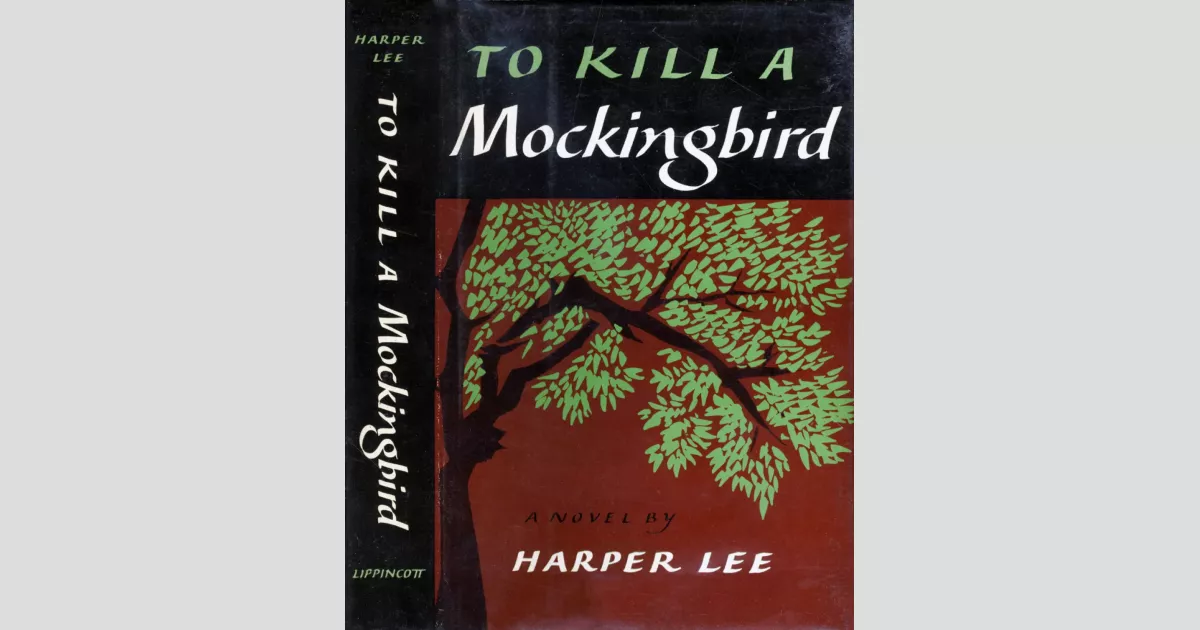To Kill a Mockingbird, a Southern Gothic novel by Harper Lee, is set in 1930s Alabama. The story revolves around Scout Finch, a young girl, her brother Jem, and their widowed father Atticus, a lawyer. Atticus defends Tom Robinson, a black man falsely accused of assaulting a white woman, Mayella Ewell, facing intense prejudice and hatred from the community. Scout and Jem learn valuable lessons about justice, empathy, and racial inequality through witnessing the trial and its aftermath. The novel explores themes of innocence, prejudice, courage, and compassion in the face of societal injustice, highlighting the moral growth of Scout as she navigates the complexities of her small town.
1919: Amasa Coleman Lee's Case
In 1919, Harper Lee's father, Amasa Coleman Lee, defended two black men accused of murder. After they were convicted, hanged, and mutilated, he never took another criminal case.
1933: Setting of Maycomb
The heart of Lee's fictional 1933 Maycomb is faithfully recreated via the art and dialogue in Fred Fordham's October 2018 release of a graphic novel.
1933: Beginning of Story Timeline
The story in To Kill a Mockingbird takes place during three years (1933-35) of the Great Depression, set in the fictional town of Maycomb, Alabama. The story begins in 1933.
1936: Event Near Monroeville, Alabama
In 1936, an event occurred near Harper Lee's hometown of Monroeville, Alabama, when she was ten years old. This event, along with observations of her family and neighbors, loosely inspired the plot and characters of To Kill a Mockingbird.
1937: Walter Lett's Death
In 1937, Walter Lett, a black man accused of raping a white woman near Monroeville, died of tuberculosis in prison after his death sentence was commuted to life in prison.
1944: Attended Huntingdon College
In 1944, Harper Lee attended Huntingdon College in Montgomery, Alabama, until 1945.
1945: Studied Law at the University of Alabama
In 1945, Harper Lee studied law at the University of Alabama until 1949.
1950: Moved to New York City
In 1950, Harper Lee moved to New York City and worked as a reservation clerk for British Overseas Airways Corporation, where she began writing a collection of essays and short stories about people in Monroeville.
1952: Death of Radley Family Son
In 1952, the son of the family whose house was always boarded up down the street from the Lees, who served as the models for the fictional Radleys, died after being hidden at home by his father for 24 years due to legal trouble and shame.
1955: Murder of Emmett Till
In 1955, Emmett Till, a black teenager, was murdered for allegedly flirting with a white woman in Mississippi. His death is considered a catalyst for the Civil Rights Movement and a possible model for the character of Tom Robinson.
1956: Riots at the University of Alabama
In 1956, riots occurred at the University of Alabama after Autherine Lucy and Polly Myers were admitted. Myers withdrew her application, and Lucy was expelled but later reinstated in 1980. These events may have shaped the novel's focus on racial issues.
1957: Completion of an earlier draft of To Kill a Mockingbird, titled Go Set a Watchman
In 1957, an earlier draft of To Kill a Mockingbird, titled Go Set a Watchman, was completed. The Watchman manuscript was believed to have been lost until Lee's lawyer Tonja Carter discovered it, but this claim has been widely disputed.
1957: Presented Writing to Literary Agent
In 1957, hoping to be published, Harper Lee presented her writing to a literary agent recommended by Truman Capote.
July 11, 1960: Publication of To Kill a Mockingbird
To Kill a Mockingbird was published on July 11, 1960. The editorial team at Lippincott warned Harper Lee that she would probably sell only several thousand copies.
1960: Travel to Kansas with Truman Capote
In 1960, Harper Lee and Truman Capote traveled to Kansas together to investigate the multiple murders that were the basis for Capote's nonfiction novel In Cold Blood.
1960: Publication of To Kill a Mockingbird
In 1960, Harper Lee's Southern Gothic novel To Kill a Mockingbird was published. The book became an instant success, particularly in high schools and middle schools within the United States.
1960: Time Magazine Review
In 1960, Time magazine's review of To Kill a Mockingbird stated that it "teaches the reader an astonishing number of useful truths about little girls and about Southern life" and calls Scout Finch "the most appealing child since Carson McCullers' Frankie got left behind at the wedding".
1961: To Kill a Mockingbird awarded the Pulitzer Prize
In 1961, when To Kill a Mockingbird was in its 41st week on the bestseller list, it was awarded the Pulitzer Prize. It also won the Brotherhood Award of the National Conference of Christians and Jews in the same year.
1962: Film Adaptation Release
In 1962, To Kill a Mockingbird was adapted into an Academy Award-winning film directed by Robert Mulligan, with a screenplay by Horton Foote.
1962: To Kill a Mockingbird won Paperback of the Year award
In 1962, To Kill a Mockingbird won the Paperback of the Year award from Bestsellers magazine.
1962: Film adaptation of To Kill a Mockingbird released
In 1962, the book was made into a well-received film with the same title, starring Gregory Peck as Atticus Finch. The film won three Oscars: Best Actor for Gregory Peck, Best Art Direction-Set Decoration, Black-and-White, and Best Writing, Screenplay Based on Material from Another Medium for Horton Foote.
1963: To Kill a Mockingbird as Subject of Classroom Study
As early as 1963, To Kill a Mockingbird became a source of controversy for its use as a classroom study material.
1964: Last Interview
In 1964, Harper Lee gave her last interview to a journalist. She was very guarded about her personal life.
1964: Lee's Hopes for the Book
In 1964, Harper Lee recalled her hopes for the book To Kill a Mockingbird.
1964: Bruell's Summary of Symbolism
In 1964, writer Edwin Bruell summarized the symbolism of To Kill a Mockingbird, stating that "'To kill a mockingbird' is to kill that which is innocent and harmless—like Tom Robinson."
1964: Lee began to turn down interviews
Starting in 1964, Harper Lee began to turn down interviews, complaining that the questions were monotonous, and grew concerned that the attention she received bordered on the kind of publicity celebrities sought.
1966: Parent protests use of rape as a plot device
In 1966, a parent in Hanover, Virginia, protested that the use of rape as a plot device was immoral.
1968: Novel second on a list of books receiving the most complaints
In 1968, The National Education Association placed the novel second on a list of books receiving the most complaints from private organizations—after Little Black Sambo.
1980: Autherine Lucy Reinstated
In 1980, Autherine Lucy, who was expelled from the University of Alabama in 1956, was reinstated.
1990: Christopher Sergel's stage adaptation debuts
In 1990, Christopher Sergel's stage adaptation of To Kill a Mockingbird debuted in Monroeville, Alabama. The play runs every May on the county courthouse grounds and townspeople make up the cast.
1990: Annual Play Performance
Since 1990, a play based on To Kill a Mockingbird has been performed annually in Harper Lee's hometown.
1991: Book of the Month Club Survey
A 1991 survey by the Book of the Month Club and the Library of Congress Center for the Book found that To Kill a Mockingbird was fourth in a list of books that are "most often cited as making a difference".
1992: Alabama editorial called for the death of Atticus
In 1992, an Alabama editorial expressed the opinion that Atticus, despite his perceived liberalism, still operated within a system of institutionalized racism and sexism, and therefore should not be revered.
1995: Lee refused to provide an introduction
In 1995, Harper Lee wrote that she would not provide an introduction to the book.
1997: Monument to Atticus erected in Monroeville
In 1997, the Alabama State Bar erected a monument to Atticus in Monroeville, marking it as the "first commemorative milestone in the state's judicial history".
2000: To Kill a Mockingbird listed in the 100 most frequently challenged books
From 2000–2009, The American Library Association reported that To Kill a Mockingbird was number 21 of the 100 most frequently challenged books.
2001: Lee inducted into Alabama Academy of Honor and Chicago reading program initiated
In 2001, Harper Lee was inducted into the Alabama Academy of Honor. In the same year, Chicago mayor Richard M. Daley initiated a reading program throughout the city's libraries, and chose his favorite book, To Kill a Mockingbird, as the first title of the One City, One Book program.
2003: Novel listed at No. 6 on the BBC's The Big Read
In 2003, the novel was listed at No. 6 on the BBC's The Big Read after a year-long survey of the British public, the highest ranking non-British book on the list.
2004: Novel chosen by 25 communities for citywide reading program
By 2004, the novel To Kill a Mockingbird had been chosen by 25 communities for variations of the citywide reading program, more than any other novel.
2005: Lee's Statement on Tom Robinson's Inspiration
In 2005, Harper Lee stated that the character of Tom Robinson in To Kill a Mockingbird was inspired by something less sensational than the Scottsboro Boys case, although the case served "the same purpose" to display Southern prejudices.
2006: Ranked Ahead of the Bible
In 2006, British librarians ranked To Kill a Mockingbird ahead of the Bible as one "every adult should read before they die".
2006: Sergel's play toured in the UK
In 2006, Christopher Sergel's play toured in the UK starting at the West Yorkshire Playhouse in Leeds, featuring Duncan Preston as Atticus Finch.
2006: Lee awarded honorary doctorate from the University of Notre Dame
In 2006, Harper Lee was awarded an honorary doctorate from the University of Notre Dame. During the ceremony, the students and audience gave Lee a standing ovation, and the entire graduating class held up copies of To Kill a Mockingbird to honor her.
November 5, 2007: Lee awarded the Presidential Medal of Freedom
On November 5, 2007, Harper Lee was awarded the Presidential Medal of Freedom by President George W. Bush.
2008: Most Widely Read Book Survey
A 2008 survey of secondary books read by students in grades 9-12 in the U.S. indicates that To Kill a Mockingbird is the most widely read book in these grades.
2008: Lee receives honorary membership to Alabama State Bar
In 2008, Harper Lee received an honorary special membership to the Alabama State Bar for creating Atticus, who "has become the personification of the exemplary lawyer in serving the legal needs of the poor".
2009: To Kill a Mockingbird listed in the 100 most frequently challenged books
From 2000–2009, The American Library Association reported that To Kill a Mockingbird was number 21 of the 100 most frequently challenged books.
2011: Sergel's play toured in the UK again
In 2011, Christopher Sergel's play toured in the UK again starting at the York Theatre Royal, featuring Duncan Preston as Atticus Finch.
2013: Sergel's play opened at Regent's Park Open Air Theatre
In 2013, Christopher Sergel's play opened the season at Regent's Park Open Air Theatre in London where it starred Robert Sean Leonard as Atticus Finch.
2014: Sergel's play returned to Regent's Park Open Air Theatre
In 2014, Christopher Sergel's play returned to the Regent's Park Open Air Theatre prior to a UK tour.
July 14, 2015: Publication of Go Set a Watchman
On July 14, 2015, Go Set a Watchman, an earlier draft of To Kill a Mockingbird, was published.
February 2016: Death of Harper Lee
Harper Lee continued to respond to her work's impact until her death in February 2016.
2016: Novel removed from classrooms in Virginia
In 2016, the novel was removed from classrooms in Virginia following parental complaints about the racist language it contains.
2017: Novel removed from classrooms in Biloxi, Mississippi
In 2017, the novel was removed from classrooms in Biloxi, Mississippi, where it was described as making people "uncomfortable".
October 2018: Graphic novel adaptation by Fred Fordham released
In October 2018, Fred Fordham adapted and illustrated the story as a graphic novel. The graphic novel faithfully recreates the heart of Lee's fictional 1933 Maycomb.
2018: Aaron Sorkin's adaptation debuts on Broadway
In 2018, a new adaptation of To Kill a Mockingbird written by Aaron Sorkin, debuted on Broadway and was nominated for nine Tony Awards, winning one.
2018: To Kill A Mockingbird chosen as America's Favorite Book
In 2018, the American public, via PBS's The Great American Read, chose To Kill A Mockingbird as America's Favorite Book.
November 5, 2019: To Kill a Mockingbird on BBC list of the 100 most influential novels
On November 5, 2019, BBC News listed To Kill a Mockingbird on its list of the 100 most influential novels.
2020: Novel number five on the list of 'Top Check Outs OF ALL TIME'
In 2020, the novel was number five on the list of "Top Check Outs OF ALL TIME" by the New York Public Library.
December 28, 2021: NYT Best Book Announcement
On December 28, 2021, The New York Times announced To Kill a Mockingbird as the best book of the past 125 years.
2021: Teachers propose removal of book from required reading in Mukilteo, Washington
In 2021, a group of teachers in Mukilteo, Washington proposed to take the book off the list of required reading for freshman and off the list of district-approved books to be studied and analyzed in classrooms, arguing that it "centers on whiteness".
Mentioned in this timeline

George W Bush the rd U S President - is...
BBC News a division of the British Broadcasting Corporation is...

Los Angeles is the most populous city in California and...

News encompasses information about current events disseminated through various media...
Virginia officially the Commonwealth of Virginia is a state located...

Chicago is the most populous city in Illinois and the...
Trending

3 months ago Alexandra Eala faces tough Hong Kong Open draw; Katie Boulter is first opponent.

8 months ago Djokovic Opens up on Feeling Unwanted Compared to Federer and Nadal, Federer's Impact

7 months ago Rafael Nadal Achieves Hole-In-One, Showcasing Sporting Prowess Beyond Tennis Skills

8 months ago John McEnroe's Tennis Mount Rushmore, Djokovic's History, and Djokovic-Murray Partnership

10 months ago Roki Sasaki's Dodgers Debut: Analyzing His First Four Starts and Future Goals.
2 months ago Bitcoin ATM scams target elderly; St. Paul considers kiosk ban due to fraud.
Popular

Thomas Douglas Homan is an American law enforcement officer who...

William Franklin Graham III commonly known as Franklin Graham is...

Jupiter is the fifth and largest planet from the Sun...

XXXTentacion born Jahseh Dwayne Ricardo Onfroy was a controversial yet...

Melania Trump a Slovenian-American former model has served as First...

Kristi Noem is an American politician who has served as...



